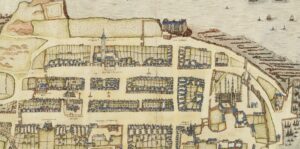Evie Papada, Giorgos Mattes and Antonis Vradis are part of an international team of researchers looking at the impact of predictive policing.
Critical Understanding of Predictive Policing (CUPP), is an international project running from 1 February 2021 until 31 January 2023 funded under the NordForsk Research and Innovation Programme on Digitalisation of the Public Sector (project no. 100786). It brings together seven partner organisations from five European countries – Denmark, Norway, Latvia, Estonia and the United Kingdom – to explore the digital transformation of law enforcement and its impact on crime detection and prevention. It aims to identify and critically assess the effects and impact of data-driven police technologies on society and end-users.
The St Andrews work package is looking at the Digitalisation of Policing and Urban Public Space.
The UK is a pioneering state in the integration of digital technologies in surveillance and policing, from smart borders (Amoore and Hall 2010) to monitoring through big data (Amoore and Raley 2017) and all the way to the management of recent security threats (Stevens and Vaughan-Williams 2016). Major cities in the country have seen a sharp rise in the use of facial recognition to monitor and control public spaces (The Independent 2019). Pancras Square in central London is at the forefront of the use of such technology. The Metropolitan Police apologized for secretly sharing images from its own database with the private corporation running the site (Metropolitan Police 2019), while the Mayor of London has written to the project owner (The Guardian 2019) over his apparent alarm concerning the use of facial recognition by the corporation’s CCTV system.
Our work package uses a range of mix methods, including field observation, semi-structured interviews with users and key stakeholders of the Kings Cross site, as well as a media discourse analysis of the coverage the site has received in the time leading to, and following the revelations concerning its use of facial recognition as a means of policing the site. Through a series of Freedom of Information (FOI) requests, we are collecting visual data from the private corporation running the site and the police itself. The aim here is to better understand the interplay between public and private in relation to the governance of facial recognition technologies and practices, as well as the effect this has on the freedoms and the everyday experiences of the site users.
Relevant Posts
Critical Understandings of Predictive Policing (Evie Papada and Antonis Vradis)
Evie Papada, Giorgos Mattes and Antonis Vradis are part of an international team of researchers looking at the impact of predictive policing. Critical Understanding of

